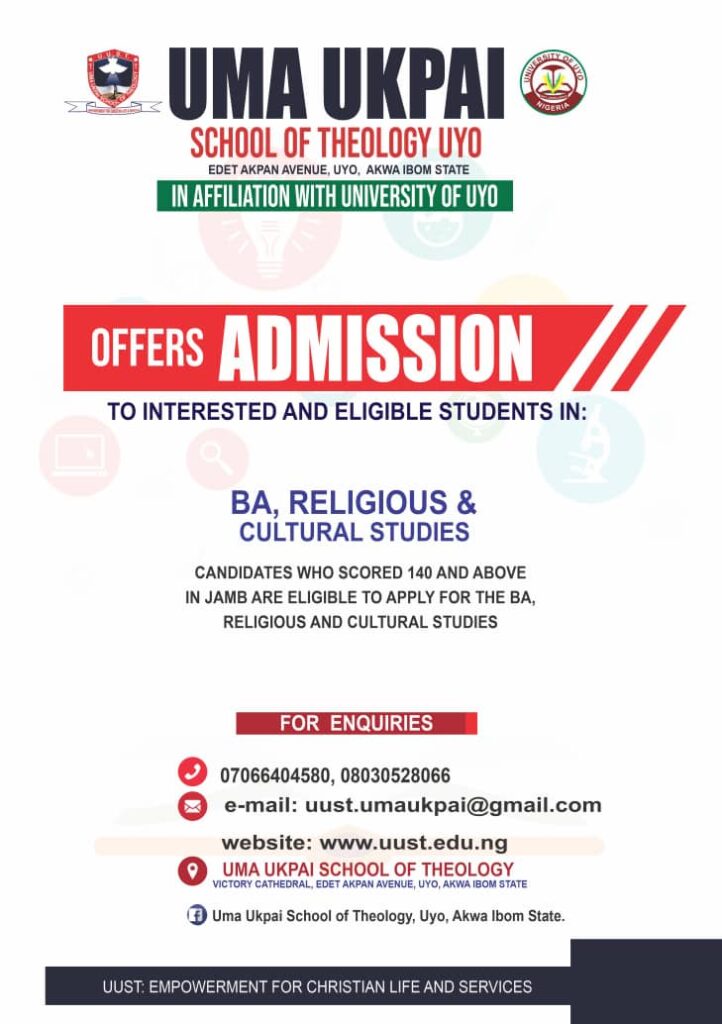ABOUT UMA UKPAI THEOLOGICAL SCHOOL
UUST HISTORY
The dream for the founding of Uma Ukpai School of Theology came to Rev. Dr. Uma Ukpai few years ago, precisely in 2007. When he presented the idea to the Council of Pastors and Elders of the Uma Ukpai Evangelistic Association Inc., there was a unanimous approval that the school project be embarked upon by the church.
Moved by the sad plight of youths within and outside the church, Rev. Dr. Uma Ukpai had in 2008 started consultations with a few people in Nigeria and abroad, informing them of his philosophy of providing a special education for Pastors and youths. This was to be achieved through the founding of a Theological School that would combine the training of pastors, with that of Business and Vocation in the form of skill acquisition. The idea is that graduate pastors and others, on leaving the school will not go roaming the streets unemployed, and looking for jobs, or repeating JAMB and other similar examinations indefinitely. Such situations according to Rev. Dr. Uma Ukpai are known to turn the youths into deviants and delinquents, while others, especially the girls are forced into unwanted marriages and pregnancies.
Rev. Dr. Uma Ukpai's philosophy and vision were overwhelmingly welcomed by the Pastors, Elders, and Other officers and members of Uma Ukpai Evangelistic Association Inc. (UUEA). They also agreed to make necessary financial sacrifices for the development of the School.
The project was equally well received abroad to the extent that two institutions of higher learning in the USA and Canada decided to affiliate the School to their institutions once it is established and meets their conditions and standards. With these support and encouragement, and during the visits of the representatives of the overseas institutions, the foundation of the first building of Uma Ukpai School of Theology was laid near the Victory Cathedral, Uyo in November 2008.
To produce leaders who are passionate for the Glory of God and the development of just and inclusive societies.
To present students with opportunities of sound theological education that will make them outstanding and ready to face the challenges of the globalized world.
Religion is a part of society, culture and history of a people. Religious and Cultural Studies, an interdisciplinary human field, is concerned with the objective and analytical study of religious phenomenon and not as a faith. Although, scholars differ on the definition of Religion, there is no denying that Religion permeates most social systems and in Africa. Religion is central to the values, cultures and world views of the people. Therefore, in keeping pace with the rational aspirations for technological advancement savoured with sound morality, the Department of Religious and Cultural Studies focuses on human intellectual and cultural developments. This is to be achieved by its strong emphasis on comparative study of religions; pragmatic or functional approach to the study of Christianity, Islam and African Religions; and the socio-cultural analysis of religious phenomena in the society.
RATIONALE
The rationale for the new approach in religion is the fact that the impact of issues at the interface of Religion and Science reverberates worldwide and across disciplines. The driving forces are diverse and include:
i. Celebrated development of Science and Technology;
ii. Globalization of Scientific cultures;
iii. Religious responses to new visions of the universe;
iv. Ethical concern prompted by modern biological breakthrough and environment threats.
AIMS AND OBJECTIVES
The aims and objectives are to:
1. Encourage Religious and Cultural Studies scholars to develop theories on how religion relates to Science, Society and Cultures and to articulate the contribution of religion to the development of culture and society,2. Provide theologians with informed scientific perspective and insight in the wonders that propels scientific research, 3. Stimulate in theologians a scientifically informed approach in their religion.
3. Stimulate in theologians a scientifically informed approach in their religion.
4. Help students to look beyond the borders of their own disciplines and to ask questions regarding ethics, public policy, ultimate meaning of life and religious truth,
5. Equip our graduates for the challenges facing religion, other humanities and science in a scientific environment,




